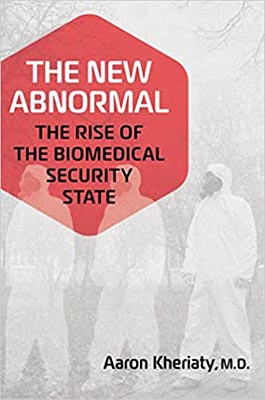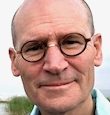Understanding the New Abnormal
- FRANCIS X. MAIER
Let's start with a simple irony. Much of today's chatter about "defending democracy," the sanctity of personal rights, and the sacred quality of human dignity comes from people who, consciously or otherwise, jeopardize all three by their actions.
 The evidence is abundant. And Aaron Kheriaty's forthcoming book, The New Abnormal: The Rise of the Biomedical Security State(to be released November 1), is Exhibit A. Every few years a book comes along like Patrick Deneen's Why Liberalism Failed or Carl Trueman's The Rise and Triumph of the Modern Self that hits a cultural nerve and mustn't be ignored; that combines elegantly lucid writing with vital and timely content.
The evidence is abundant. And Aaron Kheriaty's forthcoming book, The New Abnormal: The Rise of the Biomedical Security State(to be released November 1), is Exhibit A. Every few years a book comes along like Patrick Deneen's Why Liberalism Failed or Carl Trueman's The Rise and Triumph of the Modern Self that hits a cultural nerve and mustn't be ignored; that combines elegantly lucid writing with vital and timely content.
The New Abnormal is just such a book. It's a compelling account of the tech-driven "surveillance and control" state now emerging around us—reputedly for our own good, of course—by a doctor and scholar who's paid a heavy price for noticing it, recognizing the implications, and resisting them.
But more about that in a moment. First, some background.
Hans Jonas, the philosopher, argued that three things set humans apart from all other living creatures. The tool enables man to pursue his needs; to imprint nature with his knowledge and will. The image—the grandeur of human art—expresses his memory, his desire for beauty, and his imagination. But the greatest factor distinguishing humans from other creatures is the grave. Only human beings bury their dead. Only humans know their own mortality. And thus only humans can ask where they came from, what life means, and what comes after it. The grave, for all its pathos, is actually a statement of reverence and hope. A nearly universal fact of human civilization is this: The body, even in death and decay, carries the resonance of something unrepeatable and holy, something "other than" this world and its cycle of futility.
When a biblically-informed culture speaks of "the dignity of the human person" and "the sanctity of human life," it grounds those concepts in the Word of God. Consider Genesis 1:27: "God created man in his own image; in the image of God he created him; male and female he created them." And note Genesis 2:7: "Then the Lord God formed man of dust from the ground, and breathed into his nostrils the breath of life; and man became a living soul." The American founding was shaped in equal measure by biblical and Enlightenment thought. But even the Enlightenment, as experienced here in the United States, drew its morality and anthropology from the Jewish-Christian ages that preceded it.
What that meant, at least until the last six or seven decades, was that most of us, even those in the nation's leadership classes, genuinely believed that humans are unique in nature, unlike any other creature, with something distinct that demands elevated respect. We knew that when we crippled or diminished that dignity, we did evil. When we served it, we did good. But that was then. This is now. And we now live in a culture that speaks piously about saving the environment and rescuing birds and fish on the brink of extinction, but then doubts the very existence of a human "nature," while celebrating the mass homicide of unborn children and the composting of human bodies for, among other things, "nutrient-rich" soil enhancement.
So how does any of this relate to The New Abnormal?
For those unacquainted with the author's CV, Aaron Kheriaty is a psychiatrist and a widely published expert in the field of medical ethics and public health. For many years, he served as professor of psychiatry at the University of California, Irvine, School of Medicine and director of the Medical Ethics Program at UCI Health, where he chaired the ethics committee. He also chaired the ethics committee at the California Department of State Hospitals for several years. He was fired by UCI in December 2021 for refusing to comply with the school's Covid vaccination mandate. Though he is a committed Catholic, Kheriaty hadn't applied for a religious exemption. Instead, he had opposed the university's mandate on purely medical grounds. He noted that since he'd already had Covid, he had natural immunity to the virus, and thus should not be forced to undergo needless treatment. He's now pursuing a federal lawsuit challenging the mandate.
Kheriaty recounts his personal battle with the University of California midway through his book's second chapter. It makes for powerful reading. But it's simply one course in a much larger meal. The real genius of the text is the way Kheriaty weaves his own experience into a broader analysis and critique of—in his words—"the coming technocratic dystopia." From anyone other than a medical expert who was an early target of that dystopia, the content of The New Abnormal might sound alarmist; in the hands of Kheriaty, it's exhaustive in factual detail and deeply persuasive.
The author argues that in many ways the Covid lockdowns were unnecessary, scientifically dubious, and counterproductive. The collusion of government institutions, pharmaceutical companies, and mass media outlets—not to mention the profiteering made possible thereby—was ethically inexcusable. The degree of social control brought to bear on the general population was both unwarranted medically and unprecedented in peacetime conditions. But it did serve as a dry run for the emerging biomedical security regime; a glimpse of future "state of emergency" actions by government agencies more or less independent of any congressional supervision. Government has its own chronic addiction—to more government—and if Covid could be cast as a public health emergency demanding exceptional state interventions, then why not the climate crisis?
In his sections on "biosecurity newspeak," "biodigital surveillance," and "the transhumanist dream," the author details the growing corruption of public discourse, the systematic invasion of personal privacy, and the hollowing out of classic Hippocratic medicine by technocratic presumptions—all driven by a compulsive and ultimately irrational safetyism, but serving other, more ambitious control agendas as well.
By the end of The New Abnormal, the reader perceives that our leaders and the rest of us seem to live in two different countries. Most us still imagine society as a community of reasonably intelligent, reasonably independent individuals capable of managing their own affairs. Many of those in our expert class profess the same; but down deep, in the secret crevices of their hearts, they have a hankering for the cattle-management model Aldous Huxley captured so vividly in Brave New World and C. S. Lewis imagined in The Abolition of Man. Modern life is so very complex, after all, and the guidance of experts is so obviously sensible and efficient—especially if you're not one of the cattle.
In Lewis's words, "if man chooses to treat himself as raw material, raw material he will be." Such a debased humanity would be a very long way from the dignity of Genesis. But that, in the view of Kheriaty, is the path we're now on. We don't have to stay on it, though. And internalizing this extraordinary book will begin the process of changing course.
 This is J. Fraser Field, Founder of CERC. I hope you appreciated this piece. We curate these articles especially for believers like you.
This is J. Fraser Field, Founder of CERC. I hope you appreciated this piece. We curate these articles especially for believers like you.
Please show your appreciation by making a $3 donation. CERC is entirely reader supported.

Acknowledgement
 Francis X. Maier. "Understanding the New Abnormal." First Things (October 4, 2022).
Francis X. Maier. "Understanding the New Abnormal." First Things (October 4, 2022).
Reprinted with permission from the author.
The Author
Francis X. Maier is a senior fellow in Catholic studies at the Ethics and Public Policy Center, and the 2020-22 senior research associate at Notre Dame's Center for Citizenship and Constitutional Government.
Copyright © 2022 First Things

